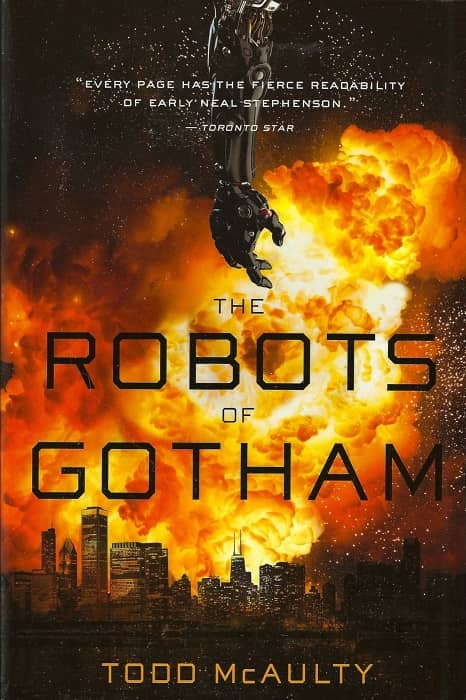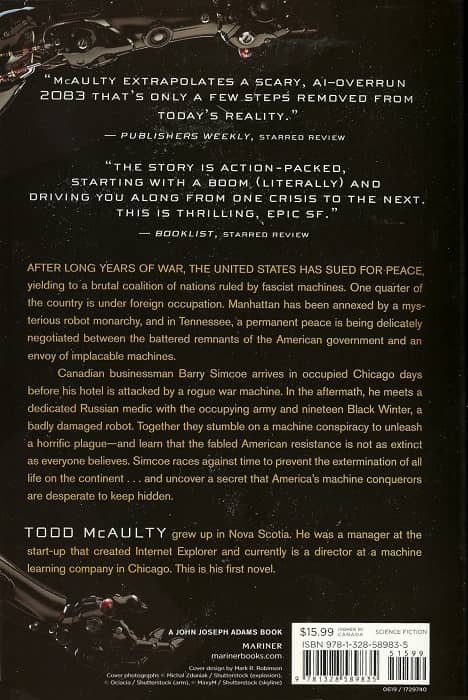Street Battles and God-like Machines: The Robots of Gotham by Todd McAulty
 |
 |
Cover design by Mark R. Robinson
The Robots of Gotham has nothing to do with Batman (much to the chagrin of one, 1-star reviewer on Goodreads) and everything to do with A.I. dominance on a global scale, with this particular story set in an embattled Chicago. The year is 2083, and the world is dominated by Venezuelan ‘peace-keeping’ forces and vast, God-like super robots. Uprisings have been hastily and ruthlessly quashed, and humans now go about their lives in an uneasy alliance with the machines they inadvertently created.
The story is told from the point of view of Barry Simcoe, a 30-something I.T. specialist and CEO of a Canadian company, who is visiting Mud Town to secure some deals. From the outset of the novel, Barry is caught up in a violent street battle involving Venezuelan forces and giant, murderous mechs. He barely squeaks out alive, and holes up in a hotel, which becomes the focal point for the rest of the book. As the story unfolds, Barry discovers an insidious plot to do away with a vast swathe of humanity to pave the way for fascist robo-leaders, and he must ally himself with a collection of well-drawn characters in order to reveal the truth and, most importantly, survive.
The Robots of Gotham is a solid debut novel, coming in at 688 pages in the chunky hardback edition, and it takes commitment to heft it, even with the dust jacket off. I didn’t have to strain for long though, as reading it was a breeze. McAulty’s writing skips along lickety-split and was intriguing enough to keep me engrossed, even during the ‘technical’ bits which needed a second read, as the first time all I heard was Charlie Brown’s teacher.
I’ll admit I was surprised that the story essentially took place in one location, the hotel and its surrounding areas, as I expected a sprawling epic given the concept (and the weight of the book), and at times this made the story feel a little like a video game as Barry took off on various missions, returning to the relative safety of his hotel room to apply buffs before setting out again. Actually, this episodic format would work well if the book was turned into a binged TV show.
The world-building is really impressive, and we are offered tantalizing glimpses of the chaos ensuing on other continents through news reports and the occasional podcast from a robot called ‘Paul the Pirate.’
Speaking of social media, the entire story is narrated in first person through Barry’s personal blog. I am not a fan of first-person narratives, but this one worked for me due to the pacing, the set-ups and resolutions and the self-deprecating humour. McAulty subverts a couple of expectations, introducing military tech that I expected to see utilized in glorious Robocop/Terminator/Pacific Rim fashion, only to point out how difficult it actually is to power the damn things up.
The robots in the story take on many forms; sleek humanoid structures, lumbering juggernauts bristling with death, vast and lethal drones, and slabs. I like slabs. Somehow, McAulty managed to imbue the slabs with more charisma than some of the humans, and I really enjoyed how the robots were given such explicit personalities.
The book ends with a semi-satisfying conclusion. I say this because there are more threads left dangling than on an English teacher’s jacket and, even though this particular story is wrapped up, there is great potential for future sequels.
I would imagine that the vast majority of fans of this book are salivating at the thought of returning to this future world. I know I am.
Neil Baker’s last article for us was Growing up with Rollerball. He is an author, illustrator, outdoor educator and owner of April Moon Books (AprilMoonBooks.com). His most recent books include the science fiction anthology The Stars at my Door and A Picnic at the Mountains of Madness. He currently lives near Toronto with his family and is officially an old fart.
“… the fierce readability of the early Neal Stephenson” reads that cover blurb. Wow, this McAulty guy must be happy to catch such a great endorsement! Of course, such a comment makes me wonder if the book diverts into all kinds of fascinating digressions on ancient languages and fast-food delivery techniques. (“You want fries with that mecha?”)
I loved this. I hope we get a sequel to it.
Eugene,
LOL! Speaking on behalf of my Todd McAulty alter-ego, I was thrilled to get a review like that, I can tell you. Reading Stephenson Snowcrash the year it was released was hugely influential on me.
I tried not to indulge myself in Stephenson-style digressions, though. You’ll have to ask the reviewer, Neal Baker, if I succeeded. 🙂
Bonnie,
Thank you so much! I greatly appreciated your Goodreads review, and your wonderful endorsement at File 770 shortly after the book came out — that meant a lot to me.
I especially liked your comment:
“I particularly appreciated the fact that the characters aren’t stupid or do dumb things because The Plot Demands It. They share information and think and plan as their situation gets more precarious, and the final showdown is a nail-biting confrontation where the characters’ loyalty and friendship come through.”
That meant a lot, as it was important to me that the characters behave as rational, thinking adults — planning and reacting on the page. I didn’t know if readers would feel the same way, and you were the very first one to express that sentiment. I have always remembered your comments as a result.
Thank you!